Idealism in philosophy, also known as philosophical idealism or metaphysical idealism, is the set of metaphysical perspectives asserting that, most fundamentally, reality is equivalent to mind, spirit, or consciousness; that reality is entirely a mental construct; or that ideas are the highest type of reality or have the greatest claim to being considered "real". Because there are different types of idealism, it is difficult to define the term uniformly.
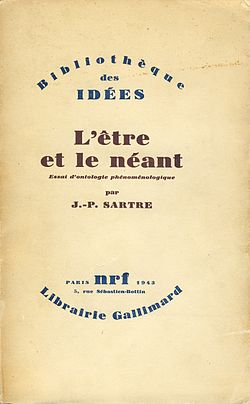
Being and Nothingness: An Essay on Phenomenological Ontology, sometimes published with the subtitle A Phenomenological Essay on Ontology, is a 1943 book by the philosopher Jean-Paul Sartre. In the book, Sartre develops a philosophical account in support of his existentialism, dealing with topics such as consciousness, perception, social philosophy, self-deception, the existence of "nothingness", psychoanalysis, and the question of free will.
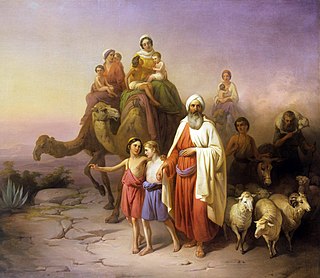
Fear and Trembling is a philosophical work by Søren Kierkegaard, published in 1843 under the pseudonym Johannes de silentio. The title is a reference to a line from Philippians 2:12, which says to "continue to work out your salvation with fear and trembling." The Philippians verse is sometimes thought to reference Psalm 55:5, which says, "Fear and trembling came upon me."

The Critique of Pure Reason is a book by the German philosopher Immanuel Kant, in which the author seeks to determine the limits and scope of metaphysics. Also referred to as Kant's "First Critique", it was followed by his Critique of Practical Reason (1788) and Critique of Judgment (1790). In the preface to the first edition, Kant explains that by a "critique of pure reason" he means a critique "of the faculty of reason in general, in respect of all knowledge after which it may strive independently of all experience" and that he aims to reach a decision about "the possibility or impossibility of metaphysics". The term "critique" is understood to mean a systematic analysis in this context, rather than the colloquial sense of the term.

Karl Rahner was a German Jesuit priest and theologian who, alongside Henri de Lubac, Hans Urs von Balthasar, and Yves Congar, is considered to be one of the most influential Catholic theologians of the 20th century. He was the brother of Hugo Rahner, also a Jesuit scholar.

Paul Johannes Tillich was a German-American Christian existentialist philosopher, Christian socialist, and Lutheran theologian who was one of the most influential theologians of the twentieth century. Tillich taught at German universities before immigrating to the United States in 1933, where he taught at Union Theological Seminary, Harvard University, and the University of Chicago.

Science of Logic, first published between 1812 and 1816, is the work in which Georg Wilhelm Friedrich Hegel outlined his vision of logic. Hegel's logic is a system of dialectics, i.e., a dialectical metaphysics: it is a development of the principle that thought and being constitute a single and active unity. Science of Logic also incorporates the traditional Aristotelian syllogism: it is conceived as a phase of the "original unity of thought and being" rather than as a detached, formal instrument of inference.
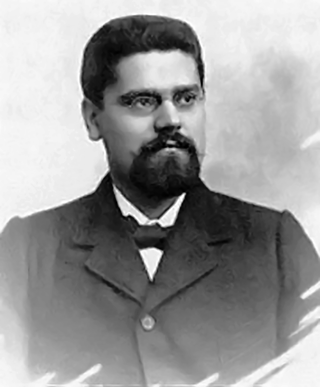
Actual idealism is a form of idealism, developed by Giovanni Gentile, that grew into a "grounded" idealism, contrasting the transcendental idealism of Immanuel Kant, and the absolute idealism of G. W. F. Hegel. To Gentile, who considered himself the "philosopher of fascism" while simultaneously describing himself as liberal and socialist, actualism was presented the sole remedy to philosophically preserving free agency, by making the act of thinking self-creative and, therefore, without any contingency and not in the potency of any other fact.

Ferdinand Canning Scott Schiller, FBA, usually cited as F. C. S. Schiller, was a German-British philosopher. Born in Altona, Holstein, Schiller studied at the University of Oxford, later was a professor there, after being invited back after a brief time at Cornell University. Later in his life he taught at the University of Southern California. In his lifetime he was well known as a philosopher; after his death, his work was largely forgotten.

Philosophical Fragments is a Christian philosophical work written by Danish philosopher Søren Kierkegaard in 1844. It was the second of three works written under the pseudonym Johannes Climacus; the other two were De omnibus dubitandum est in 1841 and Concluding Unscientific Postscript to Philosophical Fragments in 1846.

The Concept of Anxiety: A Simple Psychologically Orienting Deliberation on the Dogmatic Issue of Hereditary Sin is a philosophical work written by Danish philosopher Søren Kierkegaard in 1844.
"Critique of the Kantian philosophy" is a criticism Arthur Schopenhauer appended to the first volume of his The World as Will and Representation (1818). He wanted to show Immanuel Kant's errors so that Kant's merits would be appreciated and his achievements furthered.
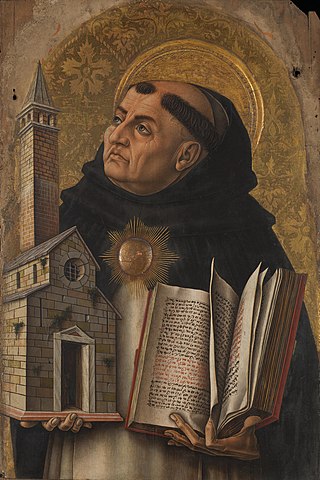
The Quinque viæ are five logical arguments for the existence of God summarized by the 13th-century Catholic philosopher and theologian Thomas Aquinas in his book Summa Theologica. They are:
- the argument from "first mover";
- the argument from universal causation;
- the argument from contingency;
- the argument from degree;
- the argument from final cause or ends.
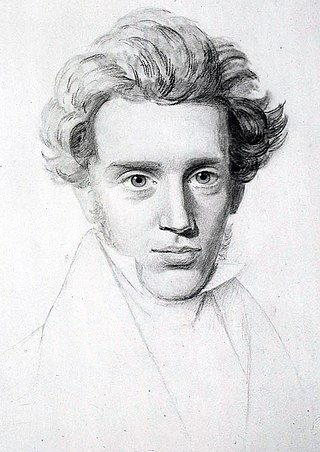
The philosophy of Søren Kierkegaard has been a major influence in the development of 20th-century philosophy, especially existentialism and postmodernism. Søren Kierkegaard was a 19th-century Danish philosopher who has been labeled by many as the "Father of Existentialism", although there are some in the field who express doubt in labeling him an existentialist to begin with. His philosophy also influenced the development of existential psychology.

The Philosophy of Freedom is the fundamental philosophical work of philosopher, Goethe scholar and esotericist Rudolf Steiner (1861–1925). It addresses the question of whether and in what sense human beings are free. Originally published in 1894 in German as Die Philosophie der Freiheit, with a second edition published in 1918, the work has appeared under a number of English titles, including The Philosophy of Spiritual Activity, The Philosophy of Freedom, and Intuitive Thinking as a Spiritual Path.

The theology of Søren Kierkegaard has been a major influence in the development of 20th century theology. Søren Kierkegaard (1813–1855) was a 19th-century Danish philosopher who has been generally considered the "Father of Existentialism". During his later years (1848–1855), most of his writings shifted from philosophical in nature to religious.
Some Marxists posit what they deem to be Karl Marx's theory of human nature, which they accord an important place in his critique of capitalism, his conception of communism, and his materialist conception of history. Marx does not refer to human nature as such, but to Gattungswesen, which is generally translated as "species-being" or "species-essence". According to a note from Marx in the Manuscripts of 1844, the term is derived from Ludwig Feuerbach's philosophy, in which it refers both to the nature of each human and of humanity as a whole.
Conceptions of God in classical theist, monotheist, pantheist, and panentheist traditions – or of the supreme deity in henotheistic religions – can extend to various levels of abstraction:
This is a glossary of terms used in New Thought.
Romantic epistemology emerged from the Romantic challenge to both the static, materialist views of the Enlightenment (Hobbes) and the contrary idealist stream (Hume) when it came to studying life. Romanticism needed to develop a new theory of knowledge that went beyond the method of inertial science, derived from the study of inert nature, to encompass vital nature. Samuel Taylor Coleridge was at the core of the development of the new approach, both in terms of art and the 'science of knowledge' itself (epistemology). Coleridge's ideas regarding the philosophy of science involved Romantic science in general, but Romantic medicine in particular, as it was essentially a philosophy of the science(s) of life.












